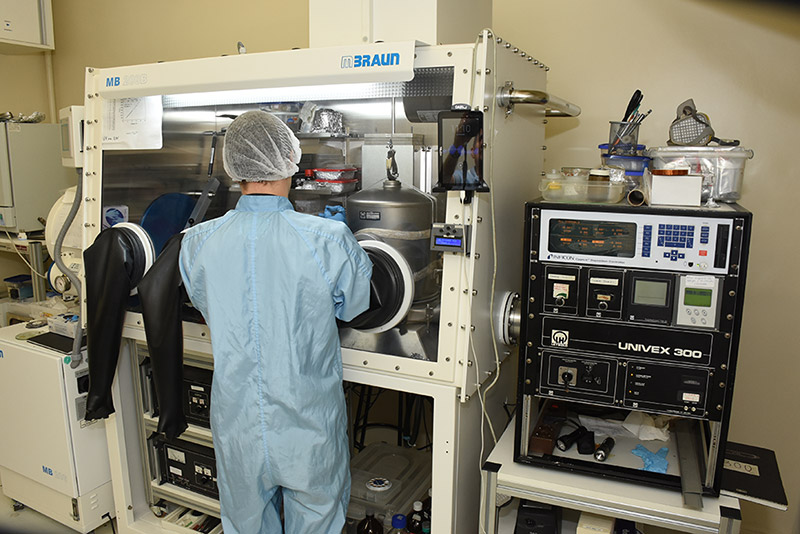
Field of expertise.
The LOEM of the Department of Physics of PUC-Rio is active in the field of Organic Electronics and in particular in the development and characterization of organic devices such as OLED, OFET, OLET, OPV, among others.
Relevance / impacts
The LOEM Group has a long and distinguished tradition with great contributions to the scientific knowledge and technological development of the field of Organic Electronics through research on OLEDs, OFETs and other devices based on organic molecules. The Laboratory also works in the development of transparent conducting oxides (TCOs) and flexible substrates (“plastic electronics”) including biocompatible (bacterial cellulose) and in the area of sensing using organic semiconductors. In its work, LOEM was responsible for the creation and successive strengthening of a scientific and technological training center in the field of production and characterization of organic devices recognized in national and international field. The work of our Group was an argument of articles from newspapers and magazines demonstrating the interest that this research arouses in several sectors of Brazilian society and Industry.
Brief history of the LOEM
LOEM began its activities in the late 1990s. Drawing on expertise in thin films using various organic compounds and experimental assemblies, we have developed research lines related to organic electroluminescent devices. The Laboratory has an excellent infrastructure and a suitable team to develop projects and research in the field of Organic Electronics. The various equipment, acquired with projects from various development agencies (CNPq, CAPES, FINEP, FAPERJ and others), were used in numerous dissertations and theses developed in our Group and Collaborating Groups and in more than 100 works in international journals. The activities carried out in this Laboratory range from basic research to applied research (manufacturing and characterization of organic devices, OLEDs and sensors). The field of organic materials is highly interdisciplinary, involving students and researchers in Physics, Chemistry, Biology, Engineering and Nanotechnology. The infrastructure of this Laboratory allows not only to grow thin films of different materials (mono and multilayer) and to characterize them electrically and optically, but also to manufacture prototypes of devices from these materials. In the scope of the research we highlight: growth of thin films of different materials by different techniques of deposition and the manufacture of organic devices and sensors.
Infrastructure.
The infrastructure of LOEM includes:
- Cleanroom for deposition of thin films and device fabrication;
- Two deposition systems for thin organic and metallic films integrated in a controlled atmosphere system (glove-boxes) equipped for resistive thermal deposition of thin films, with automatic thickness control, possibility of co-deposition and temperature control;
- (E-beam) and cathodic erosion (rf-sputtering) deposition systems with automatic thickness control and temperature control;
- Two spin-coating deposition systems for deposition of films, cleaning of substrates and photolithography, one of them inside the glove-box;
- Dektak 150 profilometer equipped with the N-Lite option for thickness measurements in organic films (soft materials);
- Fluorimeter (PTI) for stationary measurements of fluorescence and visible and near infrared (NIR) electroluminescence;
- Fluorimeter (Horiba) for time-resolved fluorescence and phosphorescence measurements;
- System for measures of mobility in organic films (CELIV) and (photo-CELIV) with laser;
- System for measuring organic magnetoresistance by the magnetic field modulation technique;
- System for measuring sheet resistivity by Hall effect;
- System for current-voltage-luminance characterization of electroluminescent devices.
- Station-Probe system (Cascade-Microtech) with Keysight analyzer for electrical characterization of organic transistors;
- Chapel for handling solvents and chemical compounds in general;
- Ultrasonic cleaners, drying desiccators, precision scales, digital multimeters, among other small instruments.
Other relevant information
The Laboratory of Organic and Molecular Optoelectronics (LOEM) belongs to the Physics Department of the Scientific Technical Center and is located in room 552L on the 5th floor of the Leme Cardinal Building. Rua Marquês de São Vicente 225, Gávea, Rio de Janeiro, RJ.
Contact:
Email: cremona@puc-rio.br
Tel: (21) 3527-1260 ext 229
